
|
|
Earth Maiden ArjunaAs with most "Nature vs Technology" stories, I find myself at odds with this one. Arjuna is a series with a lot to say, and if you're watching with an open mind, it should provoke many a thought. But while half of its points are ones I would agree with, the other half I pretty vehemently disagreed with. I don't want it to sound like I hated the series, but it certainly provoked thoughts in both directions for me. This will be a tough review to write.
 You would think that a magical girl sci-fi fantasy would be 100% my jam, but... Arjuna is a series about planetarianism (i.e. the belief that the planet itself is a living being), and as most planetarianist stories agree, humans are doing an absolute dogshit job of keeping it alive. Between excessive pollution, overproduction, overconsumption and frenzied consumerism, humans are actively trashing the ecology of the planet, and Arjuna explores this theme by borrowing elements of Hindu mythology to create a sort of modern epic about achieving oneness with Nature in a world that seems to be completely disconnected from it.
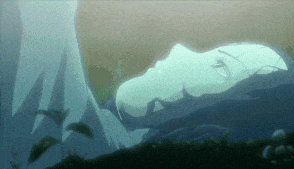 The visuals in this series are incredible, and lean heavily into the spiritual aspect of it all. Our main character (Juna) is an average high schooler at the turn of the millenium. One day while out riding with her boyfriend (Tokio) on his motorcycle, they get into an accident and Juna dies. In death, she meets a strange but gentle-natured spirit by the name of Chris (could be seen as a reference to Christ, but more likely to Hindu deity Krishna) who offers her a second chance at life if she agrees to become the new Avatar of Time and helps heal the dying planet.
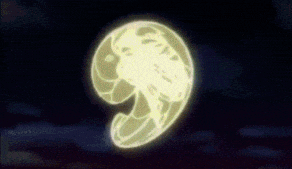 Christ, Krishna, Chrysalis...yep, this anime is definitely trying to deadname me. Since "Avatar" is a word that's been a bit muddied in the last 20 years by pop culture media, let's clear up its meaning real quick. An "avatar" is a physical incarnation of a deity that has descended to Earth. It's a pretty common element in Hindu mythology, and many other cultures as well. As an English loanword, we often use "avatar" to describe something that represents a person on another plane of reality. For example, before we referred to them as "profile pics" or "icons", we called them "avatars" because that little picture that appeared next to our names when we posted on a given website was the physical representation of ourselves in the world of the internet. Another example: if you play MMO games like Final Fantasy XIV, your Warrior of Light is the Avatar of YOU in the world of Hydaelyn. Anyway, as a new Avatar, Juna is granted a strong sense of empathy and the ability to summon both a powerful bow and a guardian spirit (Ashura) that she can barely control. She can also see that giant spirit worms are attacking all over Japan, and quickly learns to use her newfound powers to save Tokio and others from certain destruction.
 Now appearing at an Unleash The Archers concert near you! But every time she draws her bow, Chris cryptically chides her for it, repeatedly asking why she wants to KILL the worms. Juna, having been thrust into this position with no tutorial or helpful Lore Dump, has no idea what the hell he's talking about. Why give her these powers if not to save people from being destroyed by the worms? We as the viewers can piece together the reasons pretty quickly, but the rest of the anime is about Juna making that discovery for herself. Chris suggests they abduct the newly-resuscitated Juna and dump her in the wilderness to let her fend for herself, as a harsh learning experience. We also learn here that Chris and his cohorts are members of a paramilitary group by the name of SEED (no relation to the soldiers of Final Fantasy VIII, to keep up the FF references), and we learn that Chris is apparently a sickly bedridden psychic who can only communicate telepathically, and his two associates act as his arms and legs in the world. They spend most of their time tracking the spirit worms from a command center and deploying from a helicopter to help evacuate wherever the worms attack.
 I love how you can just TELL this anime is from the year 2001. Alone in the wilderness, this is where the core themes of the show really start to open up. Juna immediately realizes she has no idea how to survive without modern conveniences. She doesn't even know what kind of plants she can eat, though she becomes acutely aware that bugs and other creatures around her seem to "instinctively" know these things. Seeing the world around her, listening and feeling, she becomes aware of just how disconnected from it all she's been living. She has no sense of scale or balance with the world outside of the city she lives in. From this point on, the series showcases the myriad ways in which we've lost touch with our planet, the very thing that keeps us sustained. It focuses heavily on the way we mistreat natural resources, the way we poison the ecology that keeps Nature healthy and functioning in the first place, and the way we are trained to accept the reality with which we're presented without a second thought.
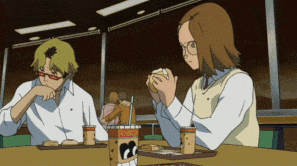 An image can still be very powerful even it makes you giggle out of context. While watching, I was almost immediately reminded of the classic experimental film Koyaanisqatsi, which I then realized I had known about for 15 or more years but had never actually sat down and watched. So I pulled it up and watched that as well, realizing what a good companion piece it made. What both pieces made me realize though is that while there is a lot being said and a lot I empathize and agree with, there are also a lot of fundamental pieces to them that I DISAGREE with, on more than just semantics or technicalities. It's blatantly true, humanity is overproducing and disrupting the planet's ecosystem with the uncontrolled pollutants we keep dumping into the atmosphere - non-biodegradable materials like plastics and styrofoam, pesticides that can make crops grow bigger at the expense of potentially poisoning us, chemical warfare destroying the land along with the people we intend to kill - but rather than focus on the corporations committing these atrocities, Arjuna seems to focus more on the average everyman as the real culprit. It almost frames the issue as a problem we could easily solve if we all just stopped being mindless consumers, and that it's as much OUR fault the planet is dying as it is the people in power who are actually responsible for the pollution in the first place.
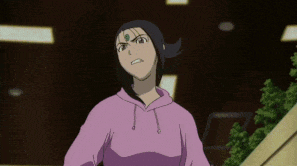 Now that's what I call an impossible burger. Part of my problem with that angle is that - no matter what Devo said - consumerism isn't born of stupidity or short-sightedness on the part of us, the consumers. It's born of an iron-fisted control of the world's resources that greedy capitalists have maintained for centuries. Food, housing, medicine, direction of labor, and social structure itself is all tightly controlled and manipulated by the whim of the rich, and no amount of raising awareness on the part of consumers can really overcome the stranglehold they have on our lives. Fellow poor people aren't the ones we need to be fighting here.
 Don't breathe this. There's a lot of other finger pointing going on here as well. The show has a lot to say about medicine and drugs, and how our reliance on them has warped us and made our bodies weaker, something I find demonstrably untrue. Rather than acknowledging that drug-induced labor can be an absolute life-saver for complicated pregnancies, Arjuna would rather have us listen to the sad little soul of the unborn baby saying "no, not yet, I'm not ready to come out yet". It makes for a nice heartstring-pulling story, but given how complex pregnancy can be, it comes across as kind of a slap in the face to anyone who owes their life to induced labor or C-section delivery. Similarly, SEED's youngest member Cindy - a telepath saved by Chris who feels extremely attached to him - also laments that she doesn't even know who her biological father is because her mother was a slut. She claims to have felt the presence of other men around her while she was in still in the womb, and harbors a deep resentment over this. Again, I understand how this ties into the show's ecological themes, but giving fetuses souls and encouraging the audience to feel for those poor unborn babies while shaming people for having sex or taking birth-related hormones or drugs is an easy gateway into some really fucked up ideals about reproductive rights. It's one step away from "reject modernity, embrace tradition", and that definitely didn't sit right with me while watching.
 It makes for a nice visual, but putting too much value on unborn lives at the expense of those carrying them is a dangerous road to walk. And then there's the entire character of Teresa Wong. During a tender moment of downtime, Teresa explains to Juna that she is "biologically male". More specifically, she explains that she was born intersex and that because she has a Y chromosome, she is "technically a man" and will never be able to have kids with this one guy she likes. She blames her body on hormone supplements her mom took while pregnant, as if being intersex has never happened before in the history of humankind before we started poisoning our bodies with these newfangled unnatural medicines we created. It's a pretty egregious misunderstanding of science that fails to recognize how incomprehensibly weird natural biology really is.
 Once again reducing a woman's worth down to her ability to bear children. But then again, this show really hammers home that it doesn't agree with or care for science at all. Teresa goes on to talk about homeopathic medicine, and how mankind has survived for eons using only natural cures, as if dying young from preventable diseases and contributing to the natural circle of life is some kind of badge of honor. And to these people, it is exactly that. Naturalism and planetarianism are essentially religions that believe the cycle of Nature is perfect, and that by altering any part of that cycle so that we live longer, or live with less pain, we risk destroying the "delicate" balance of it all. And while that makes sense in theory, it doesn't align in the slightest with what I believe.
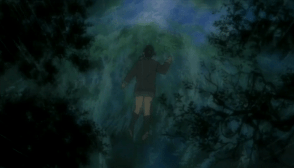 The position of Jupiter says that you should spend the rest of the week face-down in the mud. From my point of view as a believer of science, Nature is a result of the life forms on the planet interacting with their surroundings. Nature is extremely versatile and can learn to adapt to any changes it goes up against. Scientific evidence supports that major events in our planet's history have reshaped and altered its form, its atmosphere, and its aura many times over, and that Nature has always evolved with it throughout each era. Because of this, I fully believe that human beings are not "destroying" the planet so much as altering it so radically that we may very well one day make it unlivable for our own selves, thanks to the foolish greed of the rich and their desire to subjugate everyone else for their own personal gain. The planet isn't in danger, but humans are.
 Nature will easily outlive us all, because it always has and always will. Needless to say, ultimately, I found the show a bit frustrating. Because while I agreed with many of its anti-corporate sentiments and was enamored with the presentation - the music and visuals were very powerful - there's an overpowering bitterness to it all reflected in both the story itself and the characters telling it. This is a fight that activists are tired of fighting, who often feel like they're not being heard and nothing will ever get done unless the world is destroyed and remade anew, and with that it carries a certain arrogance as well. These characters are jaded because they're genuinely convinced they have everything in the universe completely figured out, and that everyone else is just too stupid to see it. It feels very similar to real-world situations where people act like a centuries-old conflict can easily be resolved with a solution they thought of in two minutes, and they pride themselves on being so smart to have thought of it so quickly. Far be it from me to tell people that their religion is wrong, but that sort of thing really pisses me off.
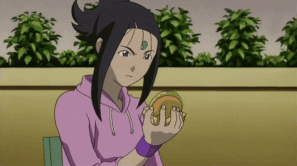 Alright, enough serious talk. Let's check back in with Juna and see if she was able to take a bite of that burger yet. But now that I've said all that, let me gather and re-phrase my thoughts about the anime itself. I don't think Arjuna is here to be arrogant. It may come off as preachy and out of touch, but I think it goes to the extremes it does because it wants you to simply THINK about these things. It invites you to meditate on our situation here on earth, and to ask yourself what you can do about it. The answer will be different from person to person, because we all live under different circumstances and flavors of capitalist slavery, and not everyone can afford organic stores, Carmen. Many people are detached from Nature because they are deliberately shut out from it by the situation they were born into, and while the idea of going off the grid is appealing, it can be virtually impossible due to how our resources have been stolen and controlled.
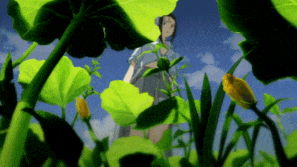 I did very much enjoy the episode about the old man with the all-natural garden though. Fuck the local HOA, let's all build natural gardens and enjoy fresh tomatoes this year. Other than providing a fascinating look into the minds of Nature worshippers, I just didn't connect with Arjuna the way it wanted me to. In retrospect, I'm glad I watched it, as it's always good to re-assess my thoughts on ecology, modern society's dependence on "unnatural" substances like microplastics and petrochemical goods, the importance of science and medicine in relation to biology, and anti-capitalist revolution. Even though I frequently disagreed with it, I still respect it, especially for its bold fusion of Koyaanisqatsi mentality and Hindu mythology, and its excellent art direction (aged 3D CGI effects aside). It's definitely something I think people should at least watch. Always keep an open mind so you can learn new things, but also question everything you encounter, and understand why you believe what you believe.
|
|